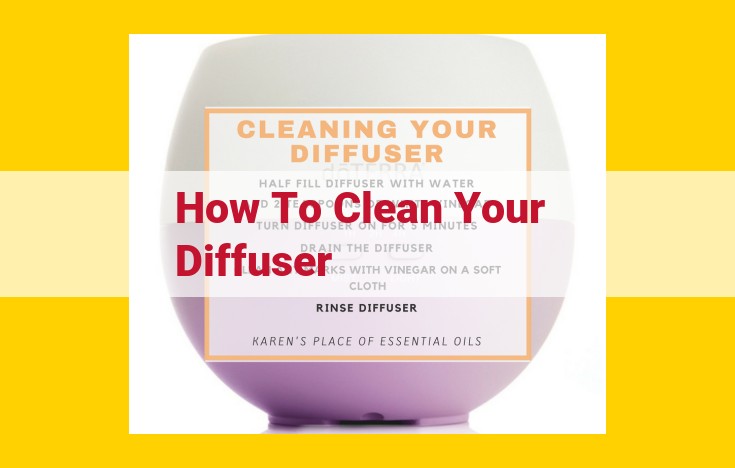To clean your diffuser, unplug it and empty the water reservoir. Wipe down the exterior with a damp cloth and a mild cleaning solution. For the reservoir, fill it with a 50:50 mixture of water and white vinegar. Let it sit for 15 minutes, then rinse it thoroughly with water. Dry the diffuser completely before using it again.
Essential Oils: The Lifeblood of Diffusers
Imagine stepping into a tranquil spa, enveloped by the soothing aromas of lavender and peppermint. These scents don’t just provide a pleasant ambiance; they possess therapeutic properties that can enhance your well-being. Essential oils, the essence of plants, are the key to unlocking these benefits through diffusers.
The Importance of High-Quality Essential Oils
Just as the purity of water matters for your health, the quality of essential oils is paramount. Pure and unadulterated oils retain their potent therapeutic properties and provide optimal benefits. Avoid synthetic or diluted oils, as they may lack efficacy and even pose health risks.
Choosing the Right Oils for Different Purposes
Essential oils are a versatile tool with a wide range of applications. Whether you seek relaxation, stress relief, or respiratory support, there’s an oil for every need.
- Lavender: Calming and soothing, promotes sleep and reduces stress.
- Peppermint: Invigorating and stimulating, improves focus and clears congestion.
- Tea Tree Oil: Antiseptic and antibacterial, purifies the air and boosts immunity.
Proper Storage Techniques for Oil Efficacy
Essential oils are delicate and can deteriorate if not stored properly. To maintain their potency and prevent oxidation:
- Store oils in dark glass bottles away from direct sunlight.
- Keep them in a cool, dry place.
- Tightly seal bottles after each use.
By following these guidelines, you’ll ensure your essential oils remain fresh and effective for optimal diffusion and therapeutic benefits.
Water: The Indispensable Companion of Essential Oils
In the realm of aromatherapy, essential oils reign supreme. Their fragrant essences, extracted from nature’s bounty, bring solace, revitalization, and well-being. But without a trusted companion, their full potential remains untapped. Enter water—the unassuming yet vital element that transforms essential oils into an olfactory symphony.
Water’s Role in Dispersing Scents
Water plays a pivotal role in the diffusion of essential oils, allowing their fragrant molecules to dance freely through the air. When essential oils are added to a diffuser, they form microscopic droplets that merge with the water vapors. As the water evaporates, it carries the oil droplets along, distributing their captivating scents throughout the space.
Ideal Water Levels for Optimal Diffusion
The optimal water level in your diffuser will depend on its size and type. Generally, smaller diffusers require less water, while larger models can accommodate more. Refer to your diffuser’s instructions for specific guidelines. Too little water can hinder diffusion, while excessive water can dilute the oil and weaken its scent.
Maintaining a Pristine Water Reservoir
To ensure your diffuser performs optimally and your essential oils remain effective, regular cleaning and disinfection are paramount. Follow these simple steps:
- Empty the water reservoir after each use.
- Wipe it down with a soft cloth to remove any residue.
- Disinfect the reservoir by filling it with a solution of 50% water and 50% white vinegar. Let it sit for 30 minutes, then rinse thoroughly with clean water.
- Allow the reservoir to air dry completely before refilling it.
By adhering to these guidelines, you’ll not only prolong the life of your diffuser but also ensure that your essential oils deliver their full therapeutic benefits.
